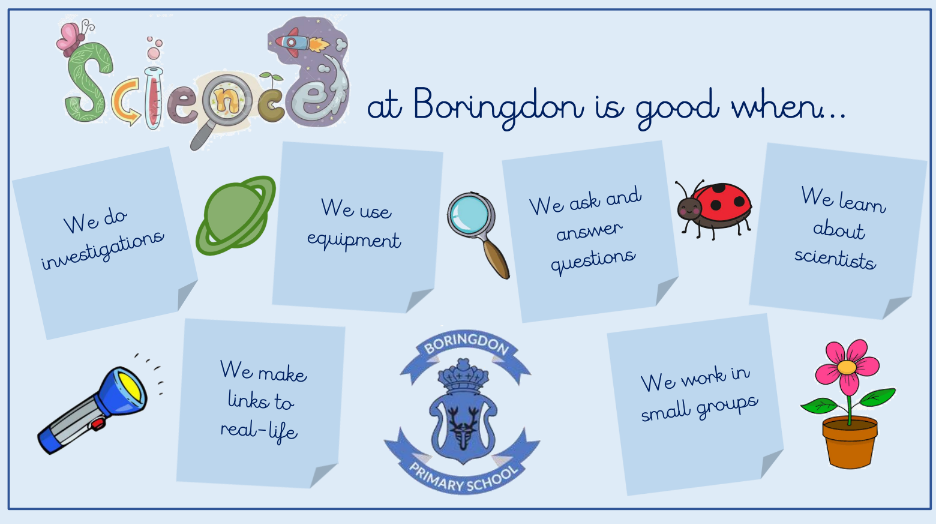Science
|
|
Science Subject Lead - Naomi Pettet naomipettet@boringdon.plymouth.sch.uk |
|
Vision At Boringdon Primary School our vision is to give pupils a Science curriculum which enables pupils to explore and discover the world around them confidently, so that they have a deeper understanding of the world we live in. To achieve this, it involves a broad range of exciting, practical hands-on experiences that encourage curiosity and questioning and lead to a progression of scientific understanding, skills and knowledge. Our aim is that these stimulating and challenging experiences, as well as use of the habitats across the school, help pupils secure and extend their scientific knowledge and vocabulary. We believe that these opportunities will ensure that our pupils are confident, life-long learners who will explore the world around them. Intent At Boringdon Primary School, we believe that a high-quality science education provides the foundations for understanding the world through the specific disciplines of biology, chemistry and physics. Science has changed our lives and is vital to the world’s future prosperity, and all pupils should be taught essential aspects of the knowledge, methods, processes and uses of science. Through building up a body of key foundational knowledge and concepts, pupils should be encouraged to recognise the power of rational explanation and develop a sense of excitement and curiosity about natural phenomena. They should be encouraged to understand how science can be used to explain what is occurring, predict how things will behave, and analyse causes. Science in our school is about developing pupils’ ideas and ways of working that enable them to make sense of the world in which they live through investigation, as well as using and applying process skills. The staff at Boringdon Primary School ensure that all pupils are exposed to high quality teaching and learning experiences, which allow pupils to explore their outdoor environment and locality, developing their scientific enquiry and investigative skills. They are immersed in scientific vocabulary, which aids pupils’ knowledge and understanding not only of the topic they are studying, but of the world around them. We intend to provide all pupils with a broad and balanced science curriculum. Implementation Teachers create a positive attitude to science learning within their classrooms and reinforce an expectation that all pupils are capable of achieving high standards in science. Our whole school approach to the teaching and learning of science involves the following;
Impact The approach at Boringdon Primary School results in a fun, engaging, high-quality science education, that provides pupils with the foundations and knowledge for understanding the world. Our engagement with the local environment ensures that pupils learn through varied and first-hand experiences of the world around them. Through various workshops, trips and interactions with experts from local secondary schools, Babcock and Plymouth University, pupils have the understanding that science has changed our lives and that it is vital to the world’s future prosperity. Pupils learn the possibilities for careers in science and learn from and work with professionals, ensuring that pupils have access to positive role models within the field of science from the immediate and wider local community. From this exposure to a range of different scientists from various backgrounds, all pupils feel they are scientists and capable of achieving. Through the progression of skills, pupils will be able to critique, hypothesise, justify thinking before reaching informed conclusions and making reasoned judgements.
|
|


